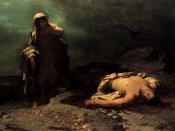Jasmine Walker
Drama 111
Allison Parker
September 17, 2008
Antigone Analysisgfdga
In the play Antigone, Sophocles uses the conflict between the written laws of man and the unwritten laws of the gods to bind both Antigone and Kreon together. Antigone's motivation is the laws ordained by the gods, while Kreon's motivation throughout the play is the laws he's created. Both characters have different motives for their actions but they also have some very distinctive similarities.
Throughout the play Antigone, the motivation that drives Antigone becomes very obvious when she is captured by the sentry and is talking to Kreon in scene two and says:
Your edict, King was strong,
But all you strength is weakness itself against
The immortal unrecorded laws of God.
They are not merely now: they were , and shall be,
Operative forever, beyond man utterly. (60)
this illustrates the tenacious spirit Antigone has for her belief in the laws of the gods.
Kreon's motivation on the other hand is quite the opposite of Antigone's. The laws that Kreon himself make drives him in the play, this assumption becomes apparent when he states that "Of all the people in this city, only she has had contempt for my law and broken it"(24). Implying that his word is law and that no matter what his laws had better not be disobeyed.
However, what motivates both characters, they are both very similar with their undaunting pride. It is shown in the play exactly how prideful Antigone and Kreon are. This is seen from Antigone in scene two when Kreon says to her "Yet you dared defy my law"(56) and Antigone proudly says "I dared. It was not God's proclamation."(57) telling Kreon bravely that his law is far from being divine. Kreon shows how...


